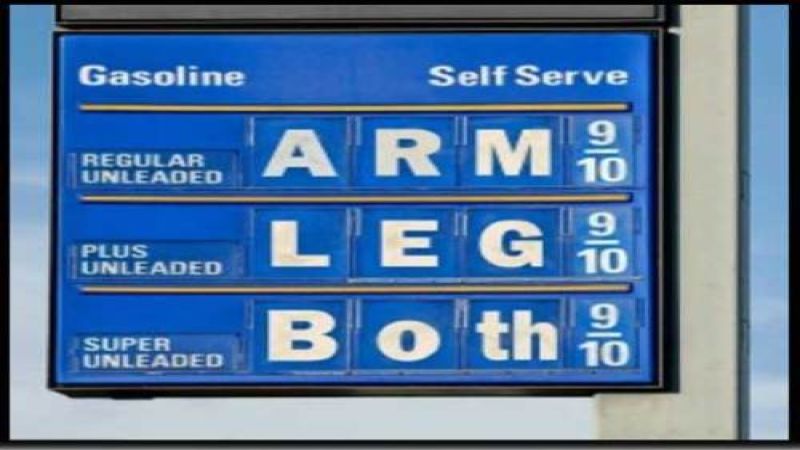West Coast residents are expected to see spiking gasoline prices because of Monday's fire at the Chevron refinery in Richmond CA. The fire started with a seemingly insignificant leak that afternoon, but quickly escalated into a major fire that has knocked the refinery out of business, as well as sickening thousands of local residents. Because the Richmond refinery produces 150,000 barrels of gasoline a day, 16 percent of West Coast gasoline consumption, there will clearly be a supply disruption and a price spike. Electric car owners are immune to this sort of price spike, because electricity has a more stable price than gasoline.
"Spot prices have already increased by as much as 30 cents per gallon in some West Coast markets and that's before the refinery damage has been fully assessed," said Patrick DeHaan of the website GasBuddy.com.
Thinking over recent years recall many incidents that disrupted, or threatened to disrupt, gasoline supplies and each time there were gasoline price spikes.
A report in the Aug 3 Chicago Tribune describes a 24 cents per gallon price spike in the Chicago area, because of a pipeline rupture in Wisconsin. An SF Chronicle article from Feb 2012 discussed a refinery fire in the Pacific Northwest, at BP's Cherry Point Refinery near Blaine, Wash., sent gasoline prices in California skyward. A scan through the news shows oil supply disruptions large and small that cause localized or more wide-spread spikes in gasoline prices.
One of the big doubts hanging over the world economy is the geopolitical struggle in the Middle East, and for example an out-and-out fight with Iran would clearly cut off oil supplies from the Persian Gulf to the rest of the world. While the U.S. doesn't buy much oil directly from the Persian Gulf, a global oil price spike would affect American oil prices.
Another big longer term doubt about oil prices is the effect known as Peak Oil. A refinery fire is a short term oil price disruption, but the oil production crunch known as peak oil is an issue that has been in progress for a couple decades. At it's core is the observation that as an oil field is halfway tapped-out, it becomes harder and harder to extract oil, and oil companies have to use all kinds of enhanced oil recovery techniques to continue extracting oil. In short all the easy oil in the world has been tapped out, and what's left is oil that's difficult and expensive to extract. For example resources way offshore in 10,000 feet of water, or requiring hydraulic fracturing, etc, to convert suboptimal oil resources into usable oil. Peak Oil researchers predict ever-rising oil prices and economic effects as the oil companies find it ever-harder to extract and supply oil.
In short there are many avenues where gasoline prices will continue rising over the long term, and spiking in response to short term effects.
At the same time electricity prices are set by utility regulatory commissions. This means electricity prices are much more stable than gasoline prices. Where electric cars are seen by many as an answer to environmental issues, there is also an economic benefit. As gasoline car owning friends grumble about rising gasoline prices, the electric car owner can be blissfully unaware of this.
Most have pigeonholed electric cars as a solution to climate and environmental issues. While electric vehicles will help with those issues, there are a whole range of other issues justifying the adoption of electric cars.











Comments
Of course they do pay double
Permalink
Of course they do pay double for the car itself. Compared to an equal gas only car. I'm just sayin'...
Most electric cars are more
Permalink
In reply to Of course they do pay double by John Goreham
Most electric cars are more expensive than a gas car of about the same size which lacks a comparable trim level and comfort.
EVs are not double what the
Permalink
In reply to Most electric cars are more by SteveEV (not verified)
EVs are not double what the comparable gas car is. When you compare them with the averages, over the average time someone keeps a car, you actually end up paying double for the gas car and saving enough money in the end to buy a new EV. For example if your paying more than $300 a month in gas you can lease a brand new Nissan Leaf or Chevy Volt.
Here is all the numbers comparing to an average car
Average vehicle in the US gets 23.9 MPG as of May 2012. Average cost of a new vehicle is $30,303, average person keeps a new car 9.2 years, traveling an average of 13,476 miles. At the end of this 9.2 years this average car would have 123,979 miles. Average cost of gasoline right now is $3.54, @ 23.9 MPG it would take 5,187 gallons of gas at a cost of $18,363. That assumes that the cost of gas does not go up. The cost of gas has doubled in the last 10 years so it is not unreasonable to assume it will double again in the next 10 years. Assuming that, the cost could be as high as $5.31/gallon average across those 9.2 years = $27,542. Oil change every 5,000 miles * $40 = $1000, filters, belts, tensioner, new plugs X 2, transmission oil changes, for just maintenance, no counting anything major breaking, another $2000. So we are somewhere between $21,363 and $30,542, just in fuel costs and maintenance + the cost of the car itself $30,303 = $51,666 - $60,845 . Leaf over that same timespan, $34,200 - $7500 = $26,700. 3.7 miles/Kwh * 123,979 * $0.15/kwh = $5026 in electricity. No oil changes, filters,plugs, coil packs and other stuff. Total cost after 9.2 years and 123,979 miles = $26,700 + $5026 = $31,726 a savings of between $19,940 and up to $29,119. That is best case scenario, a perfectly reliable gas car with no major mechanical issues between 0 and 123,929 miles. This does not count the stuff that is common between an EV and a normal car like tires, car washes, wiper fluid.
The savings is so huge, that at the end of those 9.2 years, when you battery pack still has 70%-80% of it's lifespan left, you could just still keep driving it. Or if you wanted buy an entirely new EV as you would have saved more than the EV originally cost.
just to add to the financial
Permalink
In reply to EVs are not double what the by Turbofroggy (not verified)
just to add to the financial benefit of driving electric. my other car is a 49 MPG Toyota Prius and despite its efficieny, it is still 270% more expensive to drive than my Nissan LEAF. In July, i paid $61 for gas to drive the Prius 818 miles but put out LESS than $30 to drive the LEAF 1587 miles. I will not mention that I also took advantage of the currently free quick charge stations in our area as well (when is the last time you got free gas??) If I wanted to, I could drive the LEAF for free (like LEAF owners with solar)
Lets just run the numbers
Permalink
In reply to Most electric cars are more by SteveEV (not verified)
Lets just run the numbers with all the averages shall we? Average vehicle in the US gets 23.9 MPG as of May 2012. Average cost of a new vehicle is $30,303, average person keeps a new car 9.2 years, traveling an average of 13,476 miles. At the end of this 9.2 years this average car would have 123,979 miles. Average cost of gasoline right now is $3.54, @ 23.9 MPG it would take 5,187 gallons of gas at a cost of $18,363. That assumes that the cost of gas does not go up. The cost of gas has doubled in the last 10 years so it is not unreasonable to assume it will double again in the next 10 years. Assuming that, the cost could be as high as $5.31/gallon average across those 9.2 years = $27,542. Oil change every 5,000 miles * $40 = $1000, filters, belts, tensioner, new plugs X 2, transmission oil changes, for just maintenance, no counting anything major breaking, another $2000. So we are somewhere between $21,363 and $30,542, just in fuel costs and maintenance + the cost of the car itself $30,303 = $51,666 - $60,845 . Leaf over that same timespan, $34,200 - $7500 = $26,700. 3.7 miles/Kwh * 123,979 * $0.15/kwh = $5026 in electricity. No oil changes, filters,plugs, coil packs and other stuff. Total cost after 9.2 years and 123,979 miles = $26,700 + $5026 = $31,726 a savings of between $19,940 and up to $29,119. That is best case scenario, a perfectly reliable gas car with no major mechanical issues between 0 and 123,929 miles. This does not count the stuff that is common between an EV and a normal car like tires, car washes, wiper fluid. It also gets better for the EV that the deprecation at least initially is far less. If you take that into account, the average new car looses 22% of it's value the first year, $6060 in deprecation year one. The deprecation on on the average car in the first year is more then the electricity to power a leaf for 126,929 miles.
Not sure where you get the
Permalink
Not sure where you get the double price.
For example the Chevy Volt is about 32K with tax credit. Thats with a very nice trim level, compare it to a Cruze then maybe its 8K more for the same trim, but the test drive the two and you realize that the Volt is not a Cruze it drives like an Audi. So for the 8K extra you get a car that drives and feel like an Audi and you save on $100+ plus each month on gas.
So over say 5 years your price diffrence to a Chevy Cruze will be down to maybe 2-3K for that you get a car that drive like an Audi and even better comfort with a silent drive to work.
Over 10 years its cheaper than a Cruze and you get the ride like an Audi and much lower maintenace cost than the rip off thats Audi.
This is the #1 reason why I
Permalink
This is the #1 reason why I drive in EV. Gas prices will go up, it is only a matter of time. When you look at the total cost of ownership and compare that to an average car an EV is 10s of thousands of dollars less over 9.2 years, the average someone keeps a car. Plus EVs are smooth, quiet and comfortable. Nissan Leafs and Chevy Volts are available at dealerships today. Don't listen to people who immediatly diss them, they have never test driven one. Just based on the averages here is what the numbers look like:
Average vehicle in the US gets 23.9 MPG as of May 2012. Average cost of a new vehicle is $30,303, average person keeps a new car 9.2 years, traveling an average of 13,476 miles. At the end of this 9.2 years this average car would have 123,979 miles. Average cost of gasoline right now is $3.54, @ 23.9 MPG it would take 5,187 gallons of gas at a cost of $18,363. That assumes that the cost of gas does not go up. The cost of gas has doubled in the last 10 years so it is not unreasonable to assume it will double again in the next 10 years. Assuming that, the cost could be as high as $5.31/gallon average across those 9.2 years = $27,542. Oil change every 5,000 miles * $40 = $1000, filters, belts, tensioner, new plugs X 2, transmission oil changes, for just maintenance, no counting anything major breaking, another $2000. So we are somewhere between $21,363 and $30,542, just in fuel costs and maintenance + the cost of the car itself $30,303 = $51,666 - $60,845 . Leaf over that same timespan, $34,200 - $7500 = $26,700. 3.7 miles/Kwh * 123,979 * $0.15/kwh = $5026 in electricity. No oil changes, filters,plugs, coil packs and other stuff. Total cost after 9.2 years and 123,979 miles = $26,700 + $5026 = $31,726 a savings of between $19,940 and up to $29,119. That is best case scenario, a perfectly reliable gas car with no major mechanical issues between 0 and 123,929 miles. This does not count the stuff that is common between an EV and a normal car like tires, car washes, wiper fluid. It also gets better for the EV that the deprecation at least initially is far less. If you take that into account, the average new car looses 22% of it's value the first year, $6060 in deprecation year one. The deprecation on on the average car in the first year is more then the electricity to power a leaf for 126,929 miles.
More and more of Leaf drivers
Permalink
More and more of Leaf drivers power their cars from energy derived from home solar panels. So in the above price of ownership, I can subtract 100% of electric costs to run my Leaf. BTW after 10,400 miles my Leaf was serviced and the total price I paid was $0.00 and showed no battery degradation at all. Instead of having all the moving parts of a gasoline and electric car, like the Volt, my Leaf has probably 1/3. Seats 5, has all the bells and whistles like backup camera, Bluetooth, USP port etc. I couldn't be more satisfied for the $28,000 I paid. And as a bonus it is super quiet and smooth to drive. I get in my husband's ICE and can't believe the delay as it shifts gears while accelerating.